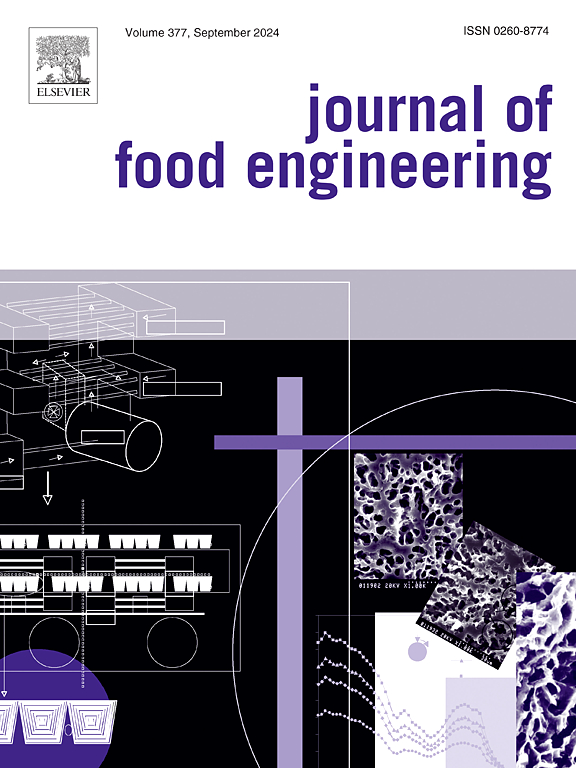The effect of surface chemistry on the caking behaviour of sucrose crystals
IF 5.3
2区 农林科学
Q1 ENGINEERING, CHEMICAL
引用次数: 0
Abstract
The caking behaviour of organic crystals presents a significant challenge in both the food and pharmaceutical industries. This study aimed to investigate how surface impurities influence the caking behaviour of sucrose (sugar) crystals. Sucrose crystals were selected as the model material due to their relevance in various industries such as food processing and pharmaceuticals. The impact of surface chemistry was assessed for sucrose crystals with varying levels of impurities, namely white sugar, light brown sugar, and dark brown sugar. These crystals were subjected to controlled cycles of humidity exposure, compaction, and drying to induce caking, simulating real-world scenarios. The caking propensity was evaluated using a compression test, while the surface chemistry was characterized through Inverse Gas Chromatography (IGC). Moisture sorption properties were evaluated using a Dynamic Vapor Sorption (DVS) technique, and the formation of solid bridges was studied using scanning electron microscopy (SEM) and X-ray computed tomography (XCT). The results indicate that impurities play a crucial role in enhancing the caking behaviour of sucrose crystals by influencing their hygroscopicity and facilitating solid bridge formation. This study provides valuable insights into the relationship between surface chemistry, moisture sorption properties, and the caking behaviour of sucrose crystals, offering strategies to mitigate caking issues.
表面化学对蔗糖晶体结块行为的影响
有机晶体的结块行为是食品和制药行业面临的一项重大挑战。本研究旨在探讨表面杂质如何影响蔗糖晶体的结块行为。由于蔗糖晶体与食品加工和制药等多个行业相关,因此被选为模型材料。对不同杂质含量的蔗糖晶体(即白糖、浅棕色糖和深棕色糖)进行了表面化学影响评估。对这些晶体进行受控的湿度暴露、压实和干燥循环,以诱发结块,模拟真实世界的情景。结块倾向通过压缩试验进行评估,而表面化学特性则通过反气相色谱法(IGC)进行表征。使用动态蒸汽吸附 (DVS) 技术评估了吸湿性能,并使用扫描电子显微镜 (SEM) 和 X 射线计算机断层扫描 (XCT) 研究了固桥的形成。结果表明,杂质通过影响蔗糖晶体的吸湿性和促进固桥的形成,在增强蔗糖晶体的结块行为中发挥了关键作用。这项研究为了解蔗糖晶体的表面化学、吸湿性能和结块行为之间的关系提供了宝贵的见解,为缓解结块问题提供了策略。
本文章由计算机程序翻译,如有差异,请以英文原文为准。
求助全文
约1分钟内获得全文
求助全文
来源期刊

Journal of Food Engineering
工程技术-工程:化工
CiteScore
11.80
自引率
5.50%
发文量
275
审稿时长
24 days
期刊介绍:
The journal publishes original research and review papers on any subject at the interface between food and engineering, particularly those of relevance to industry, including:
Engineering properties of foods, food physics and physical chemistry; processing, measurement, control, packaging, storage and distribution; engineering aspects of the design and production of novel foods and of food service and catering; design and operation of food processes, plant and equipment; economics of food engineering, including the economics of alternative processes.
Accounts of food engineering achievements are of particular value.
 求助内容:
求助内容: 应助结果提醒方式:
应助结果提醒方式:


